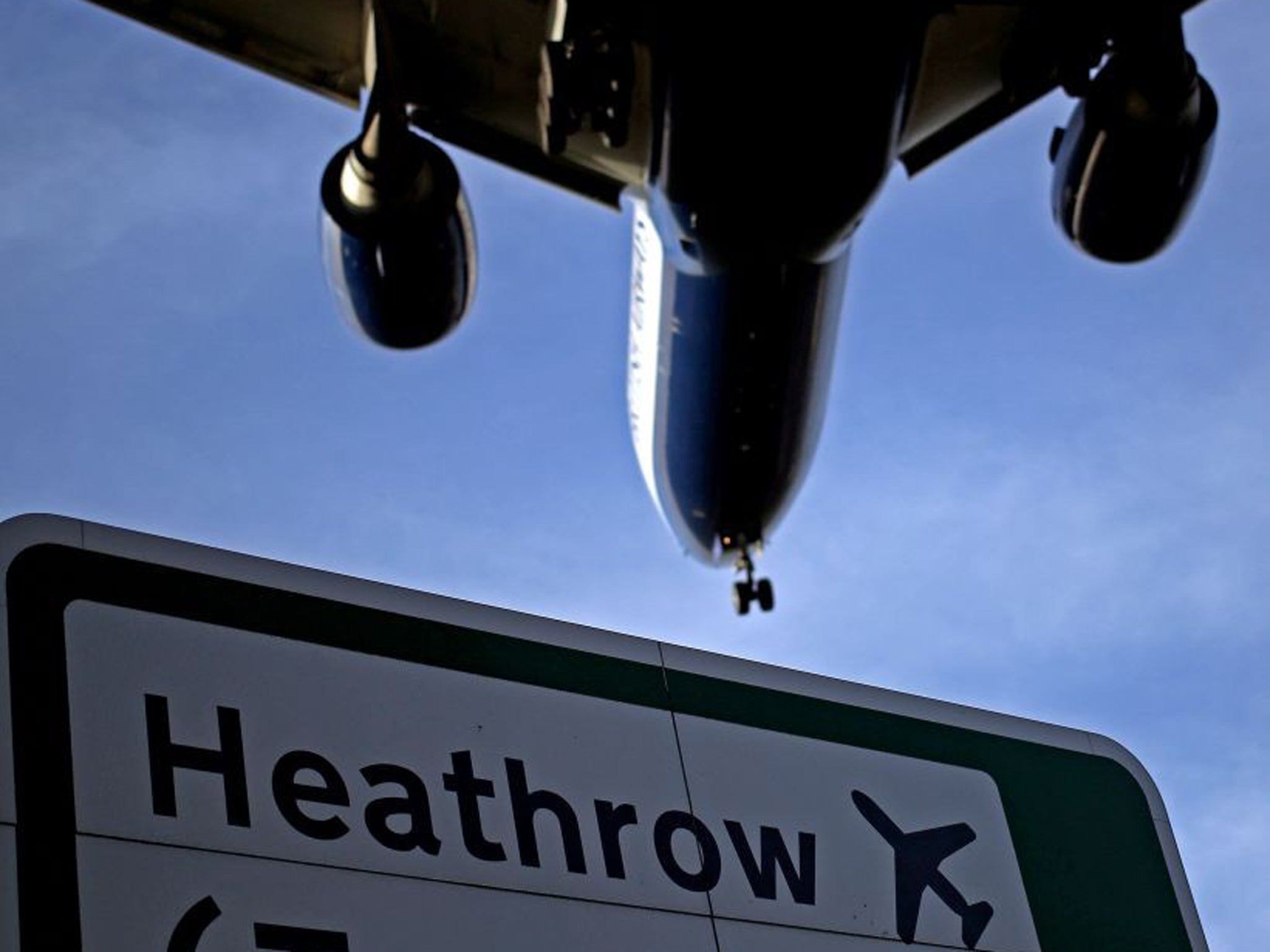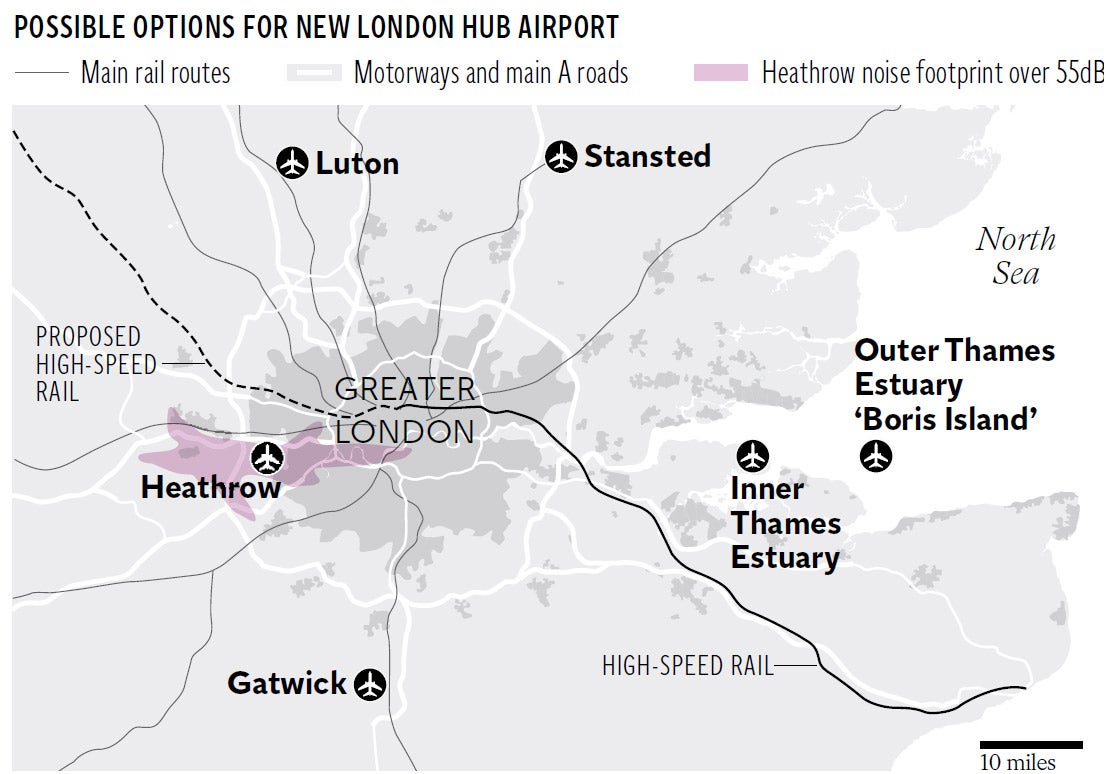Airports Commission: New runways considered at Heathrow and Gatwick - but politicians refuse to be bound by final decision
Thames Estuary options not included at present 'because there are too many uncertainties and challenges surrounding them at this stage'

Your support helps us to tell the story
From reproductive rights to climate change to Big Tech, The Independent is on the ground when the story is developing. Whether it's investigating the financials of Elon Musk's pro-Trump PAC or producing our latest documentary, 'The A Word', which shines a light on the American women fighting for reproductive rights, we know how important it is to parse out the facts from the messaging.
At such a critical moment in US history, we need reporters on the ground. Your donation allows us to keep sending journalists to speak to both sides of the story.
The Independent is trusted by Americans across the entire political spectrum. And unlike many other quality news outlets, we choose not to lock Americans out of our reporting and analysis with paywalls. We believe quality journalism should be available to everyone, paid for by those who can afford it.
Your support makes all the difference.One hundred and ten years to the day since the era of powered flight began, possible solutions to the UK's aviation capacity crunch were revealed. But even as the Davies Commission published its shortlist for an extra runway for London, politicians refused to be bound by the final decision. Doing nothing - the policy for the London area for most of the time since the Wright Brothers first flew - may yet prevail.
The Airports Commission, chaired by Sir Howard Davies, decided London will need one more runway by 2030. The interim report shortlisted just two airports for expansion, Heathrow and Gatwick.
The shock inclusion to the shortlist is a radical proposal to extend Heathrow's existing northerly runway westwards by about a mile-and-a-half, across the M25. It would allow take-offs and landings from the same runway at the same time. A new rail hub on the Great Western line could serve the expanded airport.
The other two options are a full-length new runway to the north-west of the existing pair at Heathrow, and a second at Gatwick to the south of the main runway.
The report was welcomed by leading aviation figures. Sir Richard Branson, president of Virgin Atlantic, praised the shortlist of Heathrow and Gatwick, saying "These options are the ones that make the most economic sense for the UK". They also happened to be his airline's main bases.
Sir Richard added: "We have deliberated for far too long and not built a new runway for almost 70 years. Now is the time to speed up this important decision and not to get stuck in debate again."
Jim McAuslan, general secretary of the British Airline Pilots' Association, said: "All three major parties should commit to implementing the final recommendations in their manifesto to end the decades of dithering on airport policy."
The Transport Secretary, Patrick McLoughlin, said the report "merits the fullest consideration". But he would not comment on any of the shortlisted options, nor guarantee that the Conservatives would support the commission's final verdict.
The closest that the shadow transport secretary, Mary Creagh, came to an endorsement was to say: "We will scrutinise closely the important work that Sir Howard Davies is doing"
Heathrow's chief executive, Colin Matthews, said: "It's good news for the UK economy that the commission is recognising the need for connections".
But Sir Howard roundly rejected Heathrow's argument that the nation had a choice between "one hub or no hub". He said that all the growth in air travel in the London area over the past decade had been from low-cost carriers, with so-called "legacy airlines" actually declining in passenger numbers. He speculated that future growth might come from long-haul, point-to-point budget flying rather than the traditional hub-and-spoke network.
Read more:
Gatwick's chief executive, Stewart Wingate, said expansion at the Sussex airport would "give the country the economic benefits it needs at an environmental cost it can afford".
The commission will analyse the three competing proposals in depth and select one in the summer of 2015, shortly after the next election. But further studies will be made of a Thames Estuary airport on the Isle of Grain - dubbed "Boris Island" - which could be added to the shortlist next summer.

Boris Johnson, the mayor of London, claimed his battle for a new mega-hub in north Kent was still "winnable". He said: "We have six months now to make the case for the estuary and we are going to do it." However, Sir Howard insisted that an Isle of Grain airport would need to clear a number of hurdles before it could join the shortlist. "The logistical challenges are very severe," he said. The mayor's alternative solution, expanding Stansted, was also rejected - along with more than 50 other schemes. Charlie Cornish, chief executive of Manchester Airports Group, which owns the Essex airport, said: "Stansted has a critical role to play in supporting the country's economic growth. At the right time we will bring forward proposals for a second runway at the airport to support this growth."
Opponents of airport expansion, particularly at Heathrow, reacted furiously. John Stewart, chair of HACAN Clearskies, said the proposals would trigger "18 months of intense campaigning against Heathrow expansion".
Georgia Wrighton of the Campaign to Protect Rural England said: "A second runway at Gatwick, together with sprawling development and urbanisation anticipated on a massive scale, would concrete over cherished open countryside."
The commission came up with a package of proposals to ease the capacity squeeze until a new runway can be completed. Sir Howard said: "There are many inefficiencies in the way airspace is managed." He called upon the Civil Aviation Authority, the air-traffic control firm, NATS, and airlines to collaborate to improve on the present "inefficient use of airspace".
Residents of west London and Berkshire living below Heathrow's flight paths face the prospect of more arrivals between 5am and 6am in an effort to smooth out airline schedules.
The Davies Commission also called on the government to provide parliamentary time for establishing an Independent Aviation Noise Authority to handle the concerns of residents.
Looking further ahead, Sir Howard said it was likely that there would be a "demand case" for a second additional runway by 2050. He told The Independent: "It's perfectly possible that you do a Heathrow third runway up to 2030, and then when you look at what's needed up to 2050 it's a Gatwick option, or vice-versa." However, he said a second runway could be built at Stansted or even Birmingham.
Join our commenting forum
Join thought-provoking conversations, follow other Independent readers and see their replies
Comments